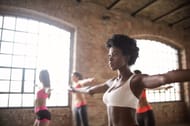When it comes to maintaining a healthy lifestyle, hygiene is undoubtedly a crucial aspect.
Whether you're hitting the school gym, a local health club, a private fitness center, or even a tennis club, you're stepping into an environment where physical activity meets communal spaces.
While the benefits of staying active are undeniable, it's essential to be aware of the potential risks associated with poor gym hygiene. Fungal infections of the skin, ranging from athlete's foot to jock itch and ringworm, are common concerns for athletes and fitness enthusiasts.
In this article, we delve into some effective gym hygiene habits to help you lower the risk of these skin infections.
Crucial gym hygiene habits that everyone should follow

#1 Wash your hands: The fundamental step
The cornerstone of personal hygiene, handwashing, often goes underestimated. However, in the context of the gym, it takes on an even more significant role.
Before and after your workout session, ensure that you thoroughly wash your hands with soap and water. The Centers for Disease Control and Prevention recommends lathering up for at least 20 seconds and rinsing well.
Proper hand hygiene can go a long way in preventing the spread of germs and potential infections.
#2 Embrace hand sanitizers when necessary
In situations where soap and water aren't readily available, a reliable alternative is an alcohol-based hand sanitizer.
Opt for a sanitizer with at least 60% alcohol content. Apply it to your hands, and rub them together till they're dry. While hand sanitizers should not replace proper handwashing, they can act as a temporary solution to maintain hygiene during your workouts.
#3 Germ-proof gym equipment: A shared responsibility

Gym equipment and mats can harbor a multitude of germs and bacteria due to their high usage.
To safeguard yourself and others, make it a habit to wipe down the equipment before and after each use. Many fitness facilities provide disinfectant sprays or wipes for this purpose.
Consider carrying a small towel and disinfectant spray in your gym bag, so you can ensure that the equipment you use is clean and germ-free.
#4 Post-workout shower: The sooner, the better
After an intense workout, the temptation to relax or head out in your sweaty clothes can be strong. However, it's essential to prioritize a post-workout shower.
Bacteria thrive in moist environments, and your sweaty attire can provide an ideal breeding ground for them. Shower as soon as possible after exercising, ensuring that you thoroughly cleanse your body and dry off with a clean towel.
Changing into dry, clean clothes afterward will further aid in maintaining skin health.
#5 Foot protection: Guard against athlete's foot
One area that demands particular attention is foot hygiene. In communal shower areas, wearing water shoes or flip flops can help protect your feet from potential fungal infections.
Make it a practice to wash your feet thoroughly, paying special attention to the spaces between your toes. If you're prone to athlete's foot, consider using antifungal powder to keep your feet dry and infection-free.
#6 Wash and rotate your workout clothes
The clothes you wear during your workouts can harbor sweat and bacteria. It's essential to wash and thoroughly dry your workout attire after each use.
That includes not only your regular gym wear but also items like swimsuits and socks. By maintaining clean workout clothing, you reduce the risk of skin infections caused by trapped moisture and bacteria.
#7 Skin-care wareness: Cover wounds and breaks
If you have any cuts, abrasions, or open wounds, it's vital to cover them before entering shared workout spaces.
Using waterproof bandages can help prevent the entry of germs and bacteria, reducing the risk of infections. Additionally, if you're dealing with an infection or skin break, it's advisable to avoid common areas like whirlpools till the issue has completely healed.
#8 Personal items: Keep them personal

Sharing personal care items like towels, water bottles, razors and makeup can lead to cross-contamination and potential spread of infections.
To minimize these risks, avoid sharing any item that comes into direct contact with another person's skin. This simple practice can contribute significantly to maintaining a hygienic workout environment.
Practicing proper gym hygiene habits is essential for every fitness enthusiast.
By following the aforementioned guidelines, including thorough handwashing, regular equipment sanitization, post-workout showers, foot protection and personal item hygiene, you can significantly reduce risk of fungal skin infections.
Remember, a few simple steps can go a long way in ensuring that your fitness journey remains a healthy and enjoyable one.
